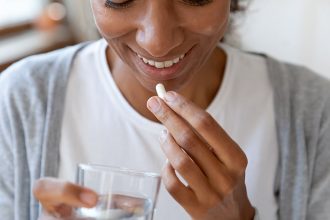The topic of gut health is gaining attention, and probiotics, known for their role in maintaining a healthy microbiome, are now seemingly added to various products. But what are probiotics, and do they truly hold the significance attributed to them?
Registered dietitians shed light on the health advantages of probiotics, who could benefit from probiotic supplements, and how to incorporate more probiotics into your diet. Keep reading to learn all about these beneficial gut bacteria.
What Exactly Are Probiotics?
Probiotics are live microorganisms, like bacteria and yeast, naturally present in the gastrointestinal (GI) tract and found in certain foods. Contrary to common belief, probiotics are not whole foods themselves; rather, they are contained within certain foods.
Considered the “good” bacteria, probiotics offer numerous health benefits, including enhanced digestion and immunity, according to Harvard Health Publishing.
Your gut, comprising the small and large intestines, hosts both probiotics and harmful bacteria like C. Diff, which can cause severe diarrhea and colon inflammation.
Despite the gut’s natural production of probiotics, it’s beneficial to consume foods rich in probiotics to augment your levels and diversify the strains of beneficial bacteria in the gut, explains Rebecca Ditkoff, RDN, a registered dietitian specializing in digestive health based in New York City.
Why Do You Need Probiotics?
Probiotics offer a multitude of health benefits that are truly worth exploring. Primarily, they play a crucial role in maintaining a balanced microbiome. Let’s delve into the details.
During illness, the presence of harmful bacteria in your digestive tract tends to increase. Probiotics step in to combat these pathogens and restore the healthy balance of good and bad bacteria within the gut.
But that’s just the tip of the iceberg. According to Kristy Del Coro, RDN, a registered dietitian based in Maine and co-founder of the Culinary Nutrition Conference, the gut microbiome impacts various body systems, including the digestive, immune, endocrine, and central nervous systems.
Research indicates that gut health:
- Influences the body’s immune response: About 70 percent of immune cells reside in the gut, highlighting its significant role in immune function (Clinical and Experimental Immunology, 2008).
- Regulates metabolism: Gut bacteria convert fiber into short-chain fatty acids, which fuel intestinal cells and may prevent bowel disorders (Harvard T.H. Chan School of Public Health).
- Plays a role in obesity prevention: Reduced microbial diversity in the gut is associated with a higher risk of obesity (Nutrients, 2019).
- Affects blood sugar levels: Certain bacterial strains in the gut are linked to increased or decreased risk of type 2 diabetes (EBio Medicine, 2020).
- Impacts mental health: Probiotics may enhance the production of mood-enhancing hormones like serotonin, with emerging research suggesting their potential in improving mental health (Annals of General Psychiatry, 2017).
In summary, the benefits of probiotics extend far beyond gut health, influencing various aspects of overall well-being.
The Best Probiotic Foods
Del Coro emphasizes that the gut microbiome is crucial for overall health, making it essential to consume foods that support its health. Probiotics are naturally found in some fermented foods and can also be added to others. Common probiotic bacteria and yeasts include Lactobacillus, Bifidobacterium, and Saccharomyces boulardii.
Here are some foods naturally rich in probiotics:
- Yogurt
- Kefir
- Miso
- Tempeh
- Kimchi
- Kombucha
- Sauerkraut
To incorporate these foods into your diet, you can use yogurt in place of mayo in salads, add sauerkraut or kimchi to grain bowls and salads, and include miso in salad dressings and sauces.
It’s important to consume probiotics in their raw form, as the cooking process can destroy the beneficial bacteria. Additionally, if you’re new to probiotics, start slowly to avoid potential side effects like increased gas or bloating. Individuals with digestive issues such as Crohn’s or IBS may also need to be cautious with probiotic-rich foods.
How Do I Know if I Need Probiotics?
While probiotic supplements may offer benefits for some individuals, they are not formally recommended, according to Harvard Health Publishing. It is advised to prioritize foods containing probiotics over supplements, particularly for those with gastrointestinal (GI) issues, as stated by Ditkoff. Specific probiotic strains have been associated with potential improvements in GI issues like gas, bloating, and constipation. However, caution is advised, and the American Gastroenterological Association (AGA) does not recommend probiotics for most digestive conditions, citing insufficient evidence for their use in treating conditions such as C. Diff, Crohn’s disease, ulcerative colitis, or IBS.
Probiotic supplementation is not recommended for critically ill individuals, those with compromised immune systems or taking immunosuppressants, according to the National Center for Complementary and Integrative Health. However, certain groups, such as adults and children on antibiotics to prevent C. Diff, infants with low birth weight, and individuals with pouchitis (inflammation after surgery for ulcerative colitis), may benefit from probiotics, according to the Mayo Clinic.
Probiotics might also contribute to oral health, assist in managing skin issues like eczema, and reduce certain allergies in children, according to the AGA. Some probiotics, like Bifidobacterium longum, have shown effectiveness in helping individuals with constipation, according to the U.S. Department of Health and Human Services.
In conclusion, the impact of probiotic supplements on GI symptoms varies among individuals, and their effectiveness may depend on the person’s specific condition. Given the individualized nature of microbiomes, the same probiotic treatment can have different effects on different people.
How to Choose a Probiotic Supplement?
Selecting the right probiotic supplement is not a one-size-fits-all decision, as effectiveness can vary depending on the amount and strain of probiotics present, according to Ditkoff. Scientific studies have shown health benefits from probiotics with CFUs (colony-forming units) ranging from 50 million to over 1 trillion per day. However, higher CFUs do not necessarily indicate better quality or effectiveness.
Research is ongoing to identify which probiotic strains are most effective for specific conditions. For instance, Lactobacillus rhamnosus, found in Culturelle’s probiotic supplements, has been demonstrated to reduce the severity and duration of antibiotic-associated diarrhea and acute infectious diarrhea. However, more research is needed to determine the most beneficial strains for other conditions, such as depression.
When considering supplementation, it’s advisable to consult with your doctor or registered dietitian to determine if a supplement is suitable for your needs and to recommend a reputable brand. It’s essential to be discerning about the source of supplements, as they are not extensively regulated.
How to Replace Good Bacteria After Antibiotics?
When prescribed antibiotics to treat a bacterial infection, the medication not only targets harmful bacteria but may also disrupt the balance of beneficial intestinal bacteria, leading to diarrhea or other digestive issues.
To restore the balance of good bacteria after completing a course of antibiotics, incorporating probiotic-rich foods such as yogurt, kefir, kimchi, or sauerkraut into your diet can be beneficial. Alternatively, taking a probiotic supplement is another option.
Research published in the May 2012 issue of the Journal of the American Medical Association indicates that probiotics can effectively reduce antibiotic-associated diarrhea.
If opting for a probiotic supplement, it’s essential to follow the dosage instructions provided on the label and store the supplement in the refrigerator to preserve its quality. Should you experience any adverse effects from antibiotics, such as diarrhea, it’s advisable to consult your doctor for guidance and support.










